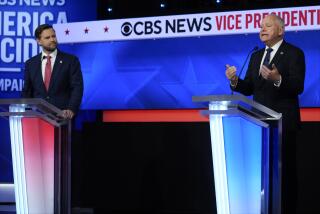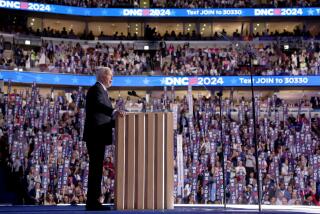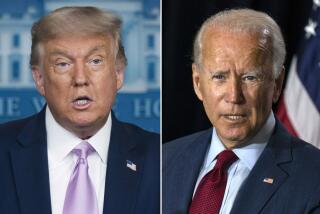McConnell says he’s open to an immigration proposal. Other Senate Republicans aren’t
Reporting from Washington — Senate Majority Leader Mitch McConnell said Thursday that he was open to considering immigration legislation, calling it one of two areas of potential compromise in the divided government that rules Washington.
Other Senate Republicans, however, expressed much more skepticism about the idea, arguing that any immigration plan is all but doomed because of partisan politics.
In an interview with a small group of reporters in his ornate office off the Senate floor, McConnell said he agreed with President Trump that there is a crisis at the southern border.
“It will not be solved simply by changing personnel,” the Kentucky Republican said, referring to the departure of several people from the top ranks at the Department of Homeland Security in recent days. “There are some changes in the law that we need to make.”
He did not offer policy specifics. But his remarks came as Trump said Wednesday that Jared Kushner, his son-in-law and advisor, is putting together an immigration plan.
In the interview, McConnell also expressed skepticism about the Senate’s ability to confirm Herman Cain as a member of the Federal Reserve Board, an idea Trump floated last week.
“Several of our members had strong feelings about people who have been mentioned in newspaper articles,” McConnell said when asked about Cain, without naming him directly. “I’ve got my hands full on the personnel we’ve already got. Not to mention the additional nominees that might come up.”
At least four Republican senators said they would oppose the nomination, all but killing Cain’s chances. McConnell suggested the White House should consider whether nominees can get enough support in the Senate to get through the confirmation process before publicly floating a name.
McConnell’s remarks came as both chambers of Congress left Washington for a two-week recess. When they return later this month, Congress will have a three-month sprint to the August recess. After that, the presidential contest is expected to heat up enough to largely halt most major legislation.
Trump’s talk of an immigration proposal marked the second time in as many weeks that the White House has floated the idea of a big legislative effort with few details to back it up. But unlike the previous such call — on healthcare, which McConnell quickly and publicly panned — he did not dismiss this one.
“We really do need to get serious about this problem,” McConnell said.
Any immigration legislation faces steep odds. Lawmakers have attempted to pursue immigration policy multiple times in the last two decades, always ending in an impasse. The differing views of the Democratic majority in the House and the Republican majority in the Senate make the process even harder.
But McConnell placed immigration in the category of potential bipartisan compromise alongside a possible deal to raise limits on federal spending. The White House has opposed the idea of raising the limits, but the vast majority of Democrats in Congress — as well as many Republicans — want to lift them.
“We need to get used to the fact that the power is divided, and the solution can only be achieved if we have serious discussions with each other,” McConnell said. “Every divided government struggles with that — how do you kind of begin to deal with people you’ve been trying to defeat in the previous election?”
McConnell said there is “no animosity” between him and the top Democrat in Congress, House Speaker Nancy Pelosi. They have a mutual interest in funding the government as two lawmakers who focused on spending legislation. But he said the two had spoken little recently.
Not all Republicans share McConnell’s limited optimism about immigration legislation.
If “you bring one immigration bill out here — I’m being a little facetious but there is a lot of truth to it — everybody on the right will say you have to load 12 million people up and get them out of the country,” said Sen. Charles E. Grassley (R-Iowa).
“And everybody on the left says, ‘If we’re going to have an immigration bill, we’re going to legalize everybody yesterday.’ ”
Even if immigration faces nearly insurmountable odds in the Senate, there may be political reasons to open a debate. Trump turned the issue into a key part of his 2016 presidential race, and it is likely to return as a 2020 issue.
“If we can’t get something done on a bipartisan basis,” said Sen. John Cornyn (R-Texas), “this is something that maybe the president and others will want to campaign on, challenge our opponents and make it [an issue] that if he gets reelected, he will have a mandate on.”
Cornyn, who has been a pivotal player in almost every major immigration effort for years, isn’t getting his hopes up that this is the year to repair the system.
“Most of the time, the immigration debate is a zero-sum game, and we never quite get there,” he said. “It always ends up breaking your heart.”
More stories from Jennifer Haberkorn »
More to Read
Get the L.A. Times Politics newsletter
Deeply reported insights into legislation, politics and policy from Sacramento, Washington and beyond. In your inbox three times per week.
You may occasionally receive promotional content from the Los Angeles Times.











